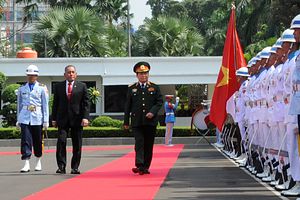Last week, an Indonesian military officer delegation was on a visit to Vietnam. The scheduled engagement spotlighted some of the ongoing efforts by the two Southeast Asian states to develop the defense aspect of the broader bilateral relationship between them.
As I have noted before in these pages, as Indonesia-Vietnam relations have developed over the years, from a comprehensive partnership agreement signed in 2003 to a strategic partnership in 2013, the two countries have also looked to make progress in the security domain as well. Defense ties, officially developed under the memorandum of understanding on defense inked in 2010, initially included exercises and dialogues but have also grown to include mechanisms on coast guard collaboration and a coordination mechanism for protecting fishermen and fishing vessels to manage infringements and occasional clashes in the maritime domain.
That has continued on into 2019 as well. While the security aspect of the relationship continues to face its share of challenges, both sides have been attempting to make further inroads. For instance, a landmark development in this regard was the holding of the first-ever Indonesia-Vietnam Defense Dialogue back in June, which had been under discussion previously by the two countries.
Last week, the defense aspect of the relationship was back in the headlines with the visit of a Indonesia military officer delegation to Vietnam. The delegation from the Indonesian Army Command and General Staff College was led by Colonel Ardiheri, the deputy director in charge of Education Development.
The delegation’s visit included a series of interactions, including a visit to Military Region 1 (MR1) Command to get a sense of defense policy in Vietnam as well as to discuss the state of bilateral security ties and broader military developments in the region of interest to both sides.
Per Vietnam’s defense ministry, during the trip there, which occurred on August 7, the delegation was briefed on the role of MR1 in Vietnam’s military and its defense activities. Both sides also exchanged information on a range of issues, including defense external affairs, recruitment, and the building of local armed forces.
The official account highlighted the importance of such interactions in enhancing defense cooperation between the two militaries as well as individual personnel. And while few specifics were offered about the details of the discussions, these exchanges will continue to be significant to watch to assess how both sides are continuing to develop the security aspect of their broader relationship.
































